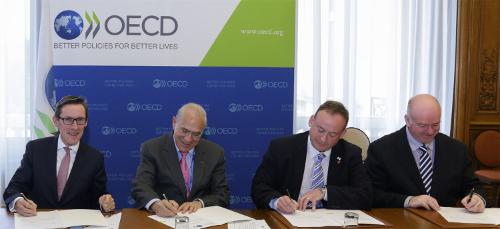Next step towards transparency in international tax matters: Five new jurisdictions sign tax co-operation agreement to enable automatic sharing of country-by-country information
As part of continuing efforts to boost transparency by multinational enterprises (MNEs), Brazil, Guernsey, Jersey, the Isle of Man and Latvia signed the Multilateral Competent Authority Agreement (MCAA) for the automatic exchange of Country-by-Country reports, on October 21, bringing the total number of signatories to 49. This marks a further milestone towards the implementation of the OECD/G20 BEPS Project and a significant increase in cross-border cooperation on tax matters.

From left/right: Senator Ian Gorst, Jersey, Secretary-General Angel Gurría, OECD, Deputy Lyndon Trott, Guernsey and Howard Quayle MHK, Isle of Man.
The MCAA will enable consistent and swift implementation of new transfer pricing reporting standards developed under Action 13 of the BEPS Action Plan. It will ensure that tax administrations obtain a complete understanding of the way MNEs structure their operations through the annual automatic exchange of country-by-country reports, while also ensuring that the confidentiality of such information is safeguarded.
Country-by-country reporting will require MNEs to provide aggregate information annually, in each jurisdiction where they do business, relating to the global allocation of income and taxes paid, together with other indicators of the location of economic activity within the MNE group. It will also cover information about which entities do business in a particular jurisdiction and the business activities each entity engages in.
On the occasion of the signing in Paris, OECD Secretary-General Angel Gurría discussed the international tax agenda with Deputy Lyndon Trott, of Guernsey, Howard Quayle MHK, of Isle of Man, and Senator Ian Gorst, of Jersey. “I congratulate Brazil, Guernsey, Jersey the Isle of Man and Latvia on their efforts toward implementing the BEPS package, and on their important role in advancing greater international tax cooperation and transparency,” Mr Gurría said.
The OECD/G20 BEPS Project set out 15 key actions to reform the international tax framework and ensure that profits are reported where economic activities are carried out and value created. BEPS is of major significance for developing countries due to their heavy reliance on corporate income tax, particularly from MNEs.
G20 Leaders endorsed a wide-ranging BEPS package in November 2015 that marks an historic opportunity for improving the effectiveness of the international tax system. The package was the result of more than two years of discussion involving all OECD and G20 countries, as well as more than a dozen developing countries. Following endorsement of the BEPS measures, the focus has shifted to designing and putting in place an inclusive framework for monitoring BEPS and supporting implementation of the measures, where currently 85 jurisdictions participate on an equal footing.
Source: Organisation for Economic Co-operation and Development
- 290 reads
Human Rights
Fostering a More Humane World: The 28th Eurasian Economic Summi

Conscience, Hope, and Action: Keys to Global Peace and Sustainability

Ringing FOWPAL’s Peace Bell for the World:Nobel Peace Prize Laureates’ Visions and Actions

Protecting the World’s Cultural Diversity for a Sustainable Future

Puppet Show I International Friendship Day 2020

